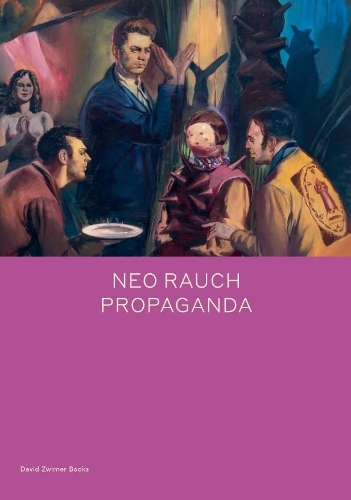
Neo Rauch: PROPAGANDA
(Hardback)
Publishing Details
Neo Rauch: PROPAGANDA
By (Author) Daniel Kehlmann
David Zwirner
David Zwirner
9th October 2019
29th August 2019
United States
Classifications
General
Non Fiction
History of art
Paintings and painting
759.3
Physical Properties
Hardback
76
Width 171mm, Height 241mm
440g
Description
German artist Neo Rauch, championed as "the painter of the zeitgeist" by The New York Times's Roberta Smith, presents new paintings in PROPAGANDA. Rauch is widely celebrated for his captivating compositions that bring together figurative painting and surrealism into an entirely new kind of visual encounter. They often hint at broader narratives and histories-seemingly reconnecting with artistic traditions of realism-but they remain dreamlike and impossible to reduce to a single story. Though his art is highly refined and executed with great technical skill, Rauch himself stresses the intuitive, deeply personal nature of how he works. As the artist notes, "My process is far less a reflection than it is drawing from the sediments of my past, which occurs in an almost trance-like state. "Eight large-scale canvases and seven smaller, more intimately scaled works continue the artist's exploration of figuration and the ambiguous nature of meaning in visual art. In some of the larger works, the saturation of the canvas with characters, objects, and, forms, all rendered at different scales and in conflicting arrangements, creates a collage-like quality-a figurative scrapbook of Rauch's personal iconography. The publication features a short story by German novelist and playwright Daniel Kehlmann, which was inspired by the paintings in this book. The fantastical text moves between present-day New York and an unknown time of enchanted forests, knights, and witches, exploring the many layers found in Rauch's canvases. Published on the occasion of the artist's solo exhibition at David Zwirner, Hong Kong in 2019, Neo Rauch: PROPAGANDA is available in both English only and bilingual English/traditional Chinese editions.
Reviews
Rauch's "technical skills are virtuosic and the paintings are consistently enigmatic. Visually, there is much to see."-- "Border Crossings"
"In Rauch's work, colour is applied selectively and with the precision of an eyedropper... The works in Propaganda beg a historical reading, but ambiguous titles and mixed symbolism defy this."--Antonia Cundy "Financial Times"
"Neo Rauch continues to be one of the most fascinating and powerful figurative painters working in the world today."-- "Juxtapoz"
"Neo Rauch's canvases are dense panopticons, the figures he paints trapped in their own story, frozen in time among other lost souls condemned to the same fate."--Penny Rafferty "Prestige Hong Kong"
"Rauch's paintings are richly colored, sumptuous compositions that contain a repertoire of characters, settings, objects, and motifs that are at once realistic and familiar while also appearing enigmatic and inscrutable."--Dimitris Lempesis "Dream Idea Machine"
"With Rauch, what draws you in is often bewilderment."--Fionnuala McHugh "South China Morning Post"
Author Bio
Neo Rauch's (b. 1960) paintings are characterized by their distinctive combination of figurative imagery and surrealist abstraction. His enigmatic compositions employ an eccentric iconography of human characters, animals, and hybrid forms within familiar-looking but imaginary settings. While Rauch begins each work without a preconceived idea of the finished result, there is a uniquely recognizable, visual coherence to his oeuvre. Paintings often display palettes of strong, complementary colors, and recurrent subjects include the seamless integration of organic and non-organic elements as well as references to the creative process, music, and manual labor. The artist's treatment of scale is deliberately arbitrary and non-perspectival, and often seems to allude to different time zones or planes of existence. Daniel Kehlmann was born in Munich in 1975 and lives in Berlin and New York. He is a novelist, essayist, and playwright, and his works have won the Candide Prize, the Heimito von Doderer Literature Prize, the Kleist Prize, the WELT Literature Prize, and the Thomas Mann Prize. His novel Measuring the World (2007) has been translated into forty languages.
